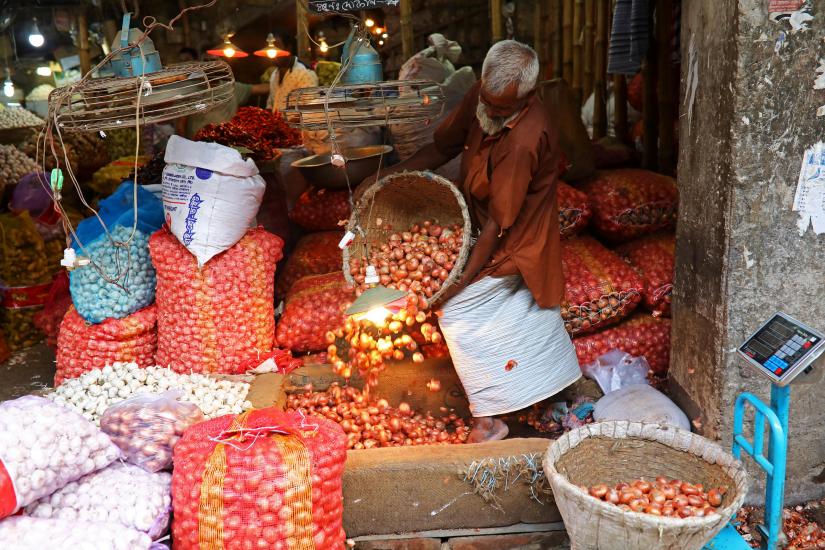 Describing the overheated onion market as temporary, Prime Minister Sheikh Hasina says there is nothing to worry about it.
Describing the overheated onion market as temporary, Prime Minister Sheikh Hasina says there is nothing to worry about it.
Her remarks came at a media call on Tuesday (Oct 29) meant to brief on her recent Azerbaijan visit to the 18th summit of the Non-Aligned Movement (NAM).
“The crisis is temporary. It won’t last for long. There’s nothing to worry about. Prices will come down in a day or two,” she said.
In a bid to control the spiraling prices, some 50,000 tonne of onion has already been imported, Hasina said before adding, “As far as I know, another 10,000 tonne will enter the country soon. So, there’s nothing to be worried about.”
On a lighter note, the prime minister said cooking is also possible without onion. “There are several dishes which can be made without onion. I don’t see any reason to be panicked over it.”
Prices of onions have gone up by several folds in the local markets following India's ban on the export of onions on Sept 29. Bangladesh is one of the top destinations for Indian onions. India exported 2.2 million tonnes of fresh onions in the 2018-19 fiscal year that ended on Mar 30, according to a Reuters report.
India exported 2.2 million tonnes of fresh onions in the 2018-19 fiscal year that ended on Mar 30, according to a Reuters report.
At the same time, Bangladesh imported 578,111 tonnes of onions from India, according to data compiled by India’s Agricultural and Processed Food Products Export Development Authority.
Bangladesh consumes a higher quantity of onions than the country produces annually.
According to the Bangladesh Bureau of Statistics, the country's onion production in the 2016-17 fiscal was 1.86 million tonne against the demand for 2.4 million tonne.
In August, the commerce ministry said that the country had 1.6 million tonnes of onions in stock and claimed that the quantity was good enough to meet the local demand.
Bangladesh is eighth on the Food and Agricultural Organization's (FAO) list of top ten countries producing onion.
China tops the FAO list with annual production of 24.28 million tonne, followed by India 22.42 million tonne, USA 3.73 million tonne, Iran 2.37 million tonne, Egypt 2.37 million tonne, Russian Federation 2.13 million tonne, Turkey 2.13 million tonne, Bangladesh 1.86 million tonne, Pakistan 1.83 million tonne and The Netherlands 1.77 million tonne.
 National
National
41182 hour(s) 15 minute(s) ago ;
Afternoon 05:10 ; Saturday ; Jun 28, 2025
Nothing to worry about onion: PM Hasina
Send
Bangla Tribune Desk
Published : 18:22, Oct 29, 2019 | Updated : 18:27, Oct 29, 2019
Published : 18:22, Oct 29, 2019 | Updated : 18:27, Oct 29, 2019
0 ...0 ...
/zmi/
Topics: Top Stories
- KOICA donates medical supplies to BSMMU
- 5 more flights to take back British nationals to London
- Covid19: Rajarbagh, Mohammadpur worst affected
- Momen joins UN solidarity song over COVID-19 combat
- Covid-19: OIC to hold special meeting
- WFP begins food distribution in Cox’s Bazar
- WFP begins food distribution in Cox’s Bazar
- 290 return home to Australia
- Third charter flight for US citizens to return home
- Dhaka proposes to postpone D8 Summit
Unauthorized use of news, image, information, etc published by Bangla Tribune is punishable by copyright law. Appropriate legal steps will be taken by the management against any person or body that infringes those laws.
Bangla Tribune is one of the most revered online newspapers in Bangladesh, due to its reputation of neutral coverage and incisive analysis.
F R Tower, 8/C Panthapath, Shukrabad, Dhaka-1207 | Phone: 58151324; 58151326, Fax: 58151329 | Mob: 01730794527, 01730794528


